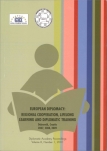This Diplomacy Dialogue Debate addresses the following question:
Could plurilateral agreements provide a way forward out of the current impasse of the WTO/Doha Round?
The inputs for this Policy Debate are based on exchanges amongst trade experts namely: Mr. Grant Aldonas, Senior Advisor (Non-resident), Centre for Strategic and International Studies; Mrs. Jane Drake-Brockman, Global Services Network; Mr. Guy de Jonquières, Senior Fellow at ECIPE and Ambassador B. K. Zutshi, Ambassador of India to the General Agreement on Tariffs and Trade (1989 to 1994)
Education plays a crucial role in fostering personal and social development, as well as economic growth. Government policies play a dominant role in this sector. Over time, trade in education services, particularly at the tertiary level, have been growing in importance. Driving factors include a combination of demographic changes, technological developments, national development goals, and governmental reforms to the funding and provision of higher education. The educational market has grown in size with more exporters entering the field to satisfy growing demand worldwide. The education sector today truly operates in a global context with institutions, programmes, and people supplying services across borders at an unprecedented scale.
 My presentation draws on my twenty years of experience as trainer, expert, consultant and university professor with special focus on management and leadership training for private and public sector organizations in Europe, Asia, Africa and North America as well as for almost all of the UN organizations and specialized agencies.
My presentation draws on my twenty years of experience as trainer, expert, consultant and university professor with special focus on management and leadership training for private and public sector organizations in Europe, Asia, Africa and North America as well as for almost all of the UN organizations and specialized agencies.
Book chapter in “European Diplomacy: Regional Cooperation, Lifelong Learning and Diplomatic Training”, Diplomatic Academy Proceedings, Vol.8, Nr1, 2011, Diplomatic Academy, Zagreb, Republic of Croatia.
![]() This book titled « Environmental conflicts in Latin America” offers in –depth analysis of environmental conflicts from a multi-stakeholder perspective in Latin American countries such as Brazil, Columbia, Chile-Argentina and Columbia-Ecuador. The case examples offer analyses based on established negotiation theory and show actors such as governments, transnational companies, NGOs and civil society engage in negotiations covering water rights, gas and oil extraction, natural reservations (indigenous people rights versus enterprises’ construction projects). (The book is in German)
This book titled « Environmental conflicts in Latin America” offers in –depth analysis of environmental conflicts from a multi-stakeholder perspective in Latin American countries such as Brazil, Columbia, Chile-Argentina and Columbia-Ecuador. The case examples offer analyses based on established negotiation theory and show actors such as governments, transnational companies, NGOs and civil society engage in negotiations covering water rights, gas and oil extraction, natural reservations (indigenous people rights versus enterprises’ construction projects). (The book is in German)
- External Evaluation of Programme Activities Fostering the Geneva Initiative
- Doha stalemate: Implications and ways forward”, CSEND Policy Brief, Geneva, August 2011
- Sustainable transborder business cooperation in the European regions: the importance of social entrepreneurship
- Intersectoral action for health

